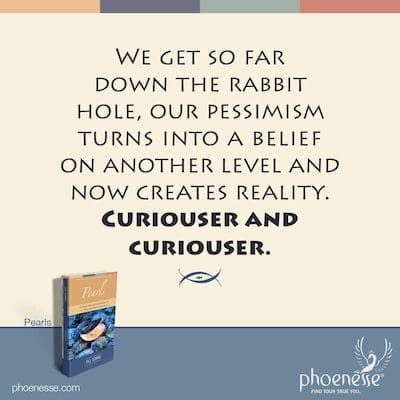Whether we think of ourselves as spiritual or religious, atheistic or None of the Above, we all have one thing in common: We humans are a superstitious lot. There is one insidious form of superstition, the superstition of pessimism. And it is the hidden culprit behind many of our disappointments in life.

It all starts with an inner attitude that goes something like this: “If I believe that something good may happen, I will be disappointed because I will chase it away with my believing in it. Maybe it’s a safer bet to believe that nothing good will happen to me. That I can’t change and have a better life”. This is the game we play with ourselves. It has a deliberate but destructive playfulness to it that is based purely on superstition.
Now, for most of us, we’re beyond believing in primitive superstitions. But nonetheless such subtler varieties do exist in nearly all of us. This one is buried in the voice that says, “I’d better not believe in the good because it might not happen”. Listen for it, because it’s in there; we need to hear these words.
At some point, this playful game starts to go sideway. And then the fun gets lost in its tragically painful effects. It turns out that denying the positive and believing in the worst—as though to appease the gods—is downright destructive. Because there is power in our thoughts. And there’s no playing with that power without getting hurt.
There’s no limit to the many things we might be applying this to in life. Perhaps it’s regarding the healing of an illness. Or when we’re alone and feeling unloved, we might playfully—safely, we think—tell others and ourselves that we’ll always be alone. Maybe we’re lacking funds or the satisfaction of a fulfilling profession. So we comfort ourselves by saying, “I’m going to believe it has to be this way, so then maybe it can come to me out of the blue”. It’s like we’re hoping for some perfect parent to magically materialize and whisk away our doubts saying, “Oh no, dear child, it’s not that bad. See, everything is going to be wonderful”. Exclamation point.
Unbeknownst to us, we are directing our soul with a belief that will create circumstances that prove it. But then we “forget” that we were playing a game, all in a spirit of superstition. Or maybe like a spirit of emotional manipulation. After a while, we get so far down the rabbit hole, we begin to believe that the negative manifestation is reality. So what started as a fun little superstitious safety valve has turned into a belief on another level of our awareness. This is what now creates reality and keeps us stuck in a lousy place. Curiouser and curiouser.
All such mental trickery is quite dangerous. We are abusing the power of the word, the power of our own thinking, and the power of teaching ourselves untruths. Whenever we come across this kind of self-deception, we have to stop, drop and roll before it burns us any further. We can objectively observe where and how we have done this to ourselves. And then we need to connect with our intention behind these maneuvers.
Next, hold up a stop-sign-to-self and say, “I want to stop fooling myself this way. Life can’t be cheated or tricked. I choose honesty from here on out. I must mean what I say to myself on the deepest levels of myself. It has to jibe with the truth of life”. We need to counter our habit of tricking ourselves, wherever it exists in us. Then we must find new pathways for our minds to follow.
This next step is the real nut. On the surface it may sound simple but it may also require us to marshal a fair bit of courage. We need to have the courage to believe in the good. This is what is called an “abyss of illusion”. Without any assurances that things are all going to turn out fine, we’re going to have to venture into unknown territory where we believe in the positive. We’ll need to assert that we have faith that the universe is totally benign—good and loving and safe. We’ll need to express the truth that there are infinite possibilities for what can happen. Gleeps.
We can pick our path. We can take the road of Eeyore-style gloom, denial and defeatism. Or follow the road of faith in the innate nature of life to unfold with beautiful possibilities. The anchor holding us back from manifesting awesome possibilities lies in our own soul. There’s nothing we can’t realize if we truly give ourselves to it; there’s nothing we can’t experience. We have the power to remove the anchor. Then involuntary processes will carry us to new shores of fulfillment riding on the wave of limitless creative possibilities. The only question is: Do we have the courage to bridge the gap by way of a faith that must wait for our inner spirit to reset the sails?
The nice thing about our old superstitions is that we just speak negative beliefs and they come true. No waiting. For certain, the questionable results we’re so keen on will happen immediately. It’s tempting to lean on that instead of investing in a very uncertain waiting period.
For the journey to having faith in a positive unfoldment takes a bit of time to ripen. This is so because our mental processes need to do a one-eighty, readjusting themselves so they can take root in the new land of abundance. We need the patience of a gardener who understands that a gestation period is required. With experience, the gardener learns that after sowing seeds, one must wait for the plants to sprout. It would be hard to trust this process until we’ve seen it in action.
So it is with each of us. That first step of faith can be a doozy.
There is a pitfall to watch out for: it’s easy to confuse this courage of which we speak—a vigorous faith in good outcomes—with wishful thinking. But they’re not the same. Many of us indulge in wishful thinking at the drop of a hat. Then, to be “realisitic”—because we know how darned disappointing the results of wishful thinking are apt to be—we scurry back to a known quantity: our pessimistic superstitions.
How do we distinguish between the two? Fortunately, there is a one clear and simple factor that will allows us to distinctly distinguish between them. With wishful thinking, we spin fantastic dreams of fulfillment without having any price to pay: no change is expected in our approach or attitude, thinking or feeling, acting or being. In our daydreams, happiness comes our way magically and gratuitously, and we don’t have to make any investment in the creative process for it to happen. We think we can game the system, not having to contribute to the evolutionary plan through a commitment to purifying our own souls.
No, in wishful thinking, we get to be totally passive, hoping against hope that something wonderful will come our way and we won’t have to lift a finger to remove the very block that is preventing the desirable thing we dream about. Easy peasy lemon squeezy. But when all is said and done, the less we invest in turning a desirable event or state into a reality, the less we ourselves even believe it will happen.
It’s like a teeter-totter: the more we justify our superstition of pessimism, the less desirable our life becomes. More and more, we will want to escape from our dreary creations by spinning daydreams that sub for reality. Believe it or not, this chews up a lot of creative energy that could be better invested in doing something real and helpful. Daydreams, then, are nothing more than the flipside of the superstition of pessimism.
On the same day—heck, maybe even in the same hour—we will waffle between these two, indulging in daydreams and then plunging minutes later into superstitious beliefs that only bad will come our way. But what if we took all that mischanneled energy and creativity and sank it into a commitment to life and ourselves? We could actually then accomplish the very thing we are daydreaming about, and start giving our best to both—which, in the end, are one and the same.
Instead, what happens is that we fail to come around on our daydreams—big surprise there—and our disappoint fortifies our pessimism. The game comes to life, sealing the deal on our wrong, negative beliefs. Now something called a vicious circle takes up residence and gains momentum, making it harder and harder to extricate ourselves from the game. The pendulum swings between thoughts of bad juju and fantastical daydreams, using one to escape the outcome of the other. Neither delivers an iota of abundance, joy, beauty, love or excitement.
What aspect of ourselves spins these wishful daydreams? They come from an undeveloped ego, not from desires of the Higher Self, or inner spirit. The weak ego is looking for a magic pill that will save it from its own underdevelopment. So, for example, instead of seeing ourselves in a productive career, contributing in a meaningful way and gaining success as a fruit of our labor, we dream of being a great person who impresses others—like our family or the people who have slighted us. Feel the difference?
Let’s look for the grain of truth under this kind of ego gratification: our desire to experience our true value. We all have dignity, but when we confuse it with the petty pride of our limited ego, it gets displaced. We’re aiming for the rich fulfillment that comes from things like recognition and respect, along with friendship, communication and abundance. But in daydreams, we acquire these things in a fairy tale manner. This is so unconvincing—even to us—that of course we can’t then believe they’re true.
As we do the work of uncovering our Lower Self and unwinding the negativity it holds, the temptation to indulge in daydreams will naturally diminish. Once we start dealing more in reality, life will become more real. Wherever the habit persists, we need to look deeper. Where do we hope for a knight in shining armor to rush in and take our cares away? How are we still hoping that a super-authority will do our work for us and ta-da, the world will be our oyster without our having to earn it.
If we allow ourselves to bring these thoughts out of the ether and into our conscious mind—perhaps writing them down to see them in black and white—we will see their absurdity. This alone will help us give them up. Once we become willing to squander ourselves into life, giving of our inner riches as generously as we want life to give to us, we’ll realize that abundance can be ours.
The road to waking up is not a direct shot. It’s two steps forward and one step back; it curves from side to side. We don’t find happiness and pleasure once and sustain it for all time. We find it, lose it, and then have to find it again. When we lose it, we often shrink back. This isn’t just an old habit. It’s the result of our commitment to the make-believe safety net of this superstition of pessimism, countered with an escape into wishful daydreaming.
Becoming aware of this is immeasurably important. We have to see this mechanism for the trick that it is. Then we have to give up this trick. We need to find the courage to believe in our own riches, and have faith in the best life can be.
Every tiny step of goodwill we take, every time we face the worst in us and restore our original beauty, we add to the great reservoir of creative forces. This is how we each do our part in helping the Christ force live and breathe. As we aid our own happiness, we contribute something powerful and valuable to the universe. Great good comes from our willingness to face ourselves and be in truth.
Return to Pearls Contents
Read Original Pathwork® Lecture: #236 The Superstition of Pessimism



